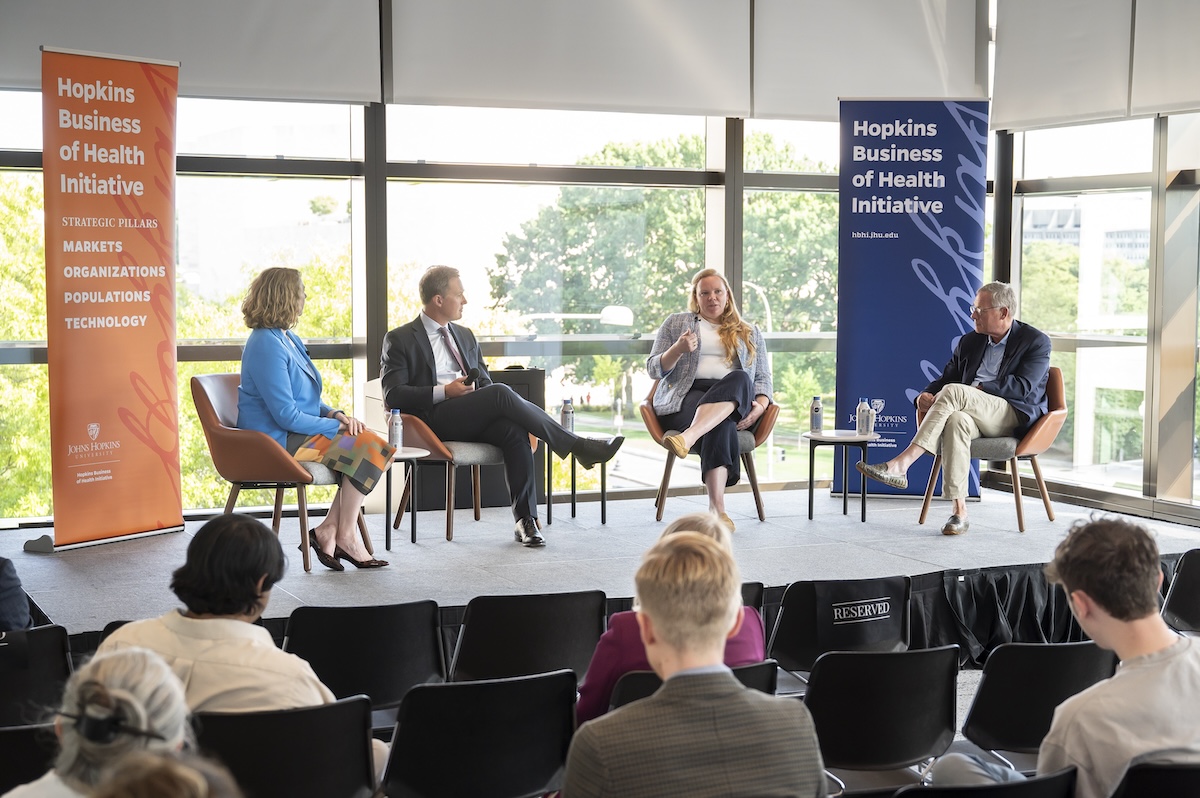
Cultivating Trust in Health Care: 8 Expert Takeaways
Featuring Natalia Hasson-Ciolko
The Hopkins Business of Health Initiative and the Center for Health Systems and Policy Models (CHSPM) recently convened an in-person panel discussion at the Bloomberg Center in Washington, D.C. about the complex issue of declining trust in America's health system, bringing together three panelists with unique perspectives on this issue.
Senator Richard Burr served as in the U.S. Senate representing North Carolina from 2005 to 2023 and he is now principal policy advisor and Chair of DLA Piper’s health policy strategic consulting service. Michael Darden, PhD, is an associate professor at the Carey School of Business, and he is the academic program director for the Master of Science in healthcare management at Carey. Lauren Taylor is a professor in the Department of Population Health at NYU Grossman School of Medicine, and she has joint appointments in healthcare delivery sciences and medical ethics. HBHI's director of policy and director of CHSPM, Melinda Buntin, PhD, served as the panel's lead and moderator.
Below are 8 expert takeaways from the panel discussion.
- It's increasingly difficult to build trust in a very complex system. In the past, repeated interactions used to allow providers and patients to develop trusting relationships, but today, a patient is lucky to see the same provider twice. “Paradoxically, although medical science is so much better today, we now have a system that makes it more difficult to foster trust,” Darden said.
- There’s a crucial distinction between being trusted and being trustworthy. Disentangling the semantics is crucial for unpacking the trust issues in health care. Taylor explained it this way: “When people trust trustworthy actors, we don't think there's a problem. But when we think they're trusting untrustworthy actors, we consider that a misinformation problem, and we need to do something about that from a policy standpoint. Similarly, when people don't trust untrustworthy actors, fine, but when they don't trust people who we do think are trustworthy, that's a different kind of potential policy problem related to trust.”
- The drivers of mistrust are as varied as the solutions. Political affiliation, socioeconomic status, geographic diversity, age, and gender can all color a a patient's perspective on the trustworthiness of the health care they receive. “We have a lot of heterogeneity in how people think about these issues, so there's no silver bullet," said Darden.
- Advancements in technology add a new dimension to questions of trust. “I think we underestimate challenges we're going to have in the coming years,” said Burr. “As technology plays a bigger role in driving where healthcare is going to go, it challenges us to accept technology's role that it plays.” However, Taylor added a caveat that we should avoid complexifying the issue of trust even further by thinking instead about evaluative technology as a question of reliability, not one of trust.
- Health care is innately complex. Even with greater transparency in the pricing of healthcare, it will never be the same purchasing relationship as consumers have with other goods and services. “I think it's a bit of a fantasy to imagine that we can make it simpler than it is,” Taylor said. “It's an open-ended affair, and it requires a degree of true vulnerability, both with our bodies and our pocketbooks, when we enter into this kind of therapeutic relationship.”
- The profit motive can’t explain declining trust because this motive has always been a part of health care. The lack of faith in professional ethics, not the distrust of profitmaking, is what's essentially changed. “The doctors of 100 years ago were good guys, but they too were trying to make a living and put food on the table for their family,” Taylor said. “There's always been an inherent profit motive, but now there’s been a diminishment in how much faith people put in the medical profession being guided by the Hippocratic Oath.”
- Environmental cues matter. Burr observed that the feeling of personal interactions matters more for perceptions of trustworthiness than more objective measures. “When an individual accesses their health care in a community health center or rural health clinic, they trust that facility more than the best hospital in Washington, D.C. It’s about interaction and having a family feel, not just about accessing that care.”
- Lack of trust can’t be solved from the top down. At higher levels of abstraction, such as the organizational or system level, levels of trust decline. “When I think about a trust-building strategy, I think it has to start hyper-locally with individuals, most likely nurses and doctors, who are still–even after Covid, after all the hand wringing, all the alarmism–very highly trusted professionals on average,” Taylor said. “If clinicians can be authentic and sincere when they say, I think you are right to put your trust, not only in me, but in this organization, in this system, I do think that's the most successful strategy we have.”
